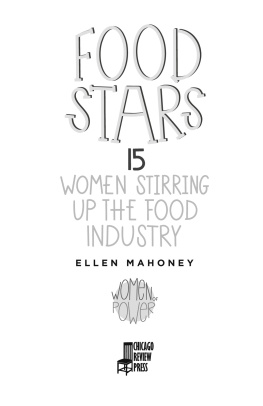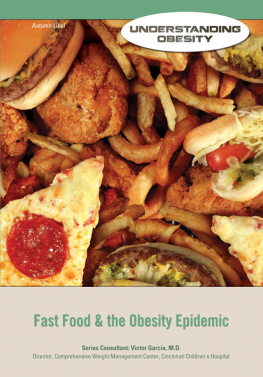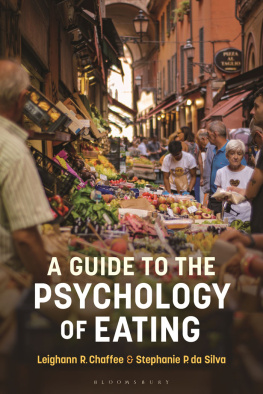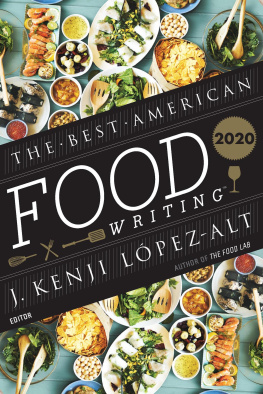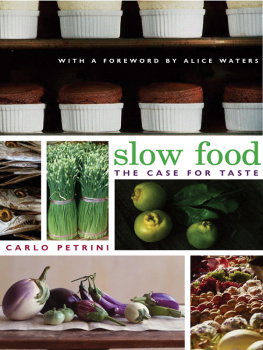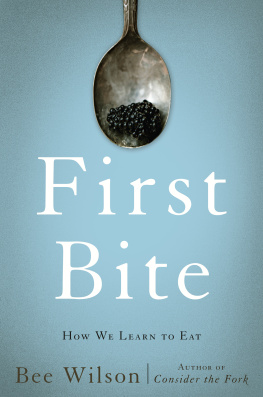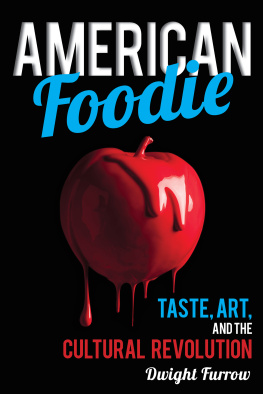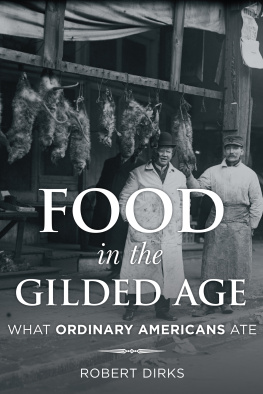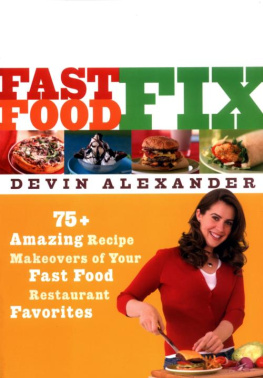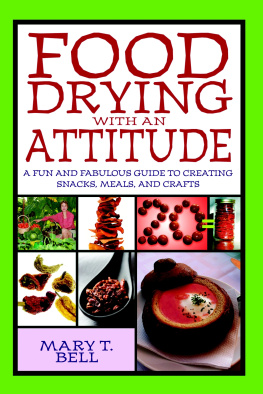How We Eat
How We Eat
Appetite, Culture, and the Psychology of Food
LEON RAPPOPORT, PH.D.

Copyright Leon Rappoport, 2003
Published by ECW PRESS
2120 Queen Street East, Suite 200, Toronto, Ontario, Canada M4E 1E2
All rights reserved. No part of this publication may be reproduced, stored in a retrieval system, or transmitted in any form by any processelectronic, mechanical, photocopying, recording, or otherwisewithout the prior written permission of the copyright owners and ECW PRESS.
NATIONAL LIBRARY OF CANADA CATALOGUING IN PUBLICATION DATA
Rappoport, Leon
How we eat: appetite, culture, and the psychology of food / Leon Rappoport
ISBN 1-55022-563-4
1. Food habitsHistory. 2. Food habitsPsychological aspects. I. Title.
GT2860.R36 2003 394.109 C2002-905418-4
Acquisition editor: Emma McKay
Copy editor: Judy Phillips
Design and typesetting: Yolande Martel
Production: Emma McKay
Printing: Transcontinental
Cover design: Guylaine Regimbald SOLO DESIGN
Front cover illustration: John Martin
This book is set in Electra
The publication of How We Eat: Appetite, Culture, and the Psychology of Food has been generously supported by the Canada Council, by the Government of Ontario through the Ontario Media Development Corporations Ontario Book Initiative, by the Ontario Arts Council, and by the Government of Canada through the Book Publishing Industry Development Program 
DISTRIBUTION
CANADA: Jaguar Book Group, 100 Armstrong Avenue,
Georgetown, Ontario L7G 5S4
UNITED STATES: Independent Publishers Group, 814 North Franklin Street, Chicago, Illinois 60610
EUROPE: Turnaround Publisher Services, Unit 3, Olympia Trading Estate, Coburg Road, Wood Green, London N2Z 6T2
AUSTRALIA AND NEW ZEALAND: Wakefield Press, 1 The Parade West (BOX 2266), Kent Town, South Australia 5071
PRINTED AND BOUND IN CANADA

To Lula Francis and in memory of her Uncle Paul
Contents
INTRODUCTION
A Half-Baked Notion
The authors itinerary from Holocaust studies and Zen practice to research on how people think about food
CHAPTER 1
From Myths to MacAttacks
How objects in nature become foods: the psychology and culture processes that have moved us from myths to McDonalds and from the raw to the cooked
CHAPTER 2
You Are What You Eat
Food preferences and ways of eating: how we present ourselves through our food habits and judge others through theirs
CHAPTER 3
Feeding Frenzies
Eating disorders and eccentricities: their origins, treatments, and social psychological implications
CHAPTER 4
The McDonaldization of Taste
Belief systems centered on hedonism, nutritionism, and spiritualism, and the sociopolitical uses of food
CHAPTER 5
From the Raw to the Cooked to the Haute Cuisine
Social, emotional, and cultural factors underlying the evolution of cuisines
CHAPTER 6
Champagne Slippers, the Twinkie Defense, and He-Man Diets
Psychoanalytic insights on the connections between eating, sexuality, and aggression; and on military rations and morale
CHAPTER 7
The Road to Wellville
New products, technologies, and marketing: consumer confusions and likely effects on eating habits
CHAPTER 8
Concluding Reflections
The anarchy of food and the development of critical self-awareness
Acknowledgments
WHEN IT COMES TO FOOD and eating habits, practically everyone has something interesting to say. But since the list of all those colleagues, students, friends, and family members who in one way or another contributed toward the development of this book could approximate a small telephone directory, I can single out only a few for special thanks.
The idea that food carries profound social-psychological meanings, and that our eating behaviors represent important ways of our being in the world, first emerged from work I was doing on psychological aspects of the Holocaust with my friend and colleague George M. Kren. It was clear to both of us that starvation was a major factor allowing the Nazis to dehumanize many of their victims. As a historian of modern European culture, George was fully aware of both the symbolic and the concrete significance of food in human affairs, and he offered important perspectives on the contents of this book.
I am also grateful to Joe Amato, a leading historian of Midwestern American culture, for his encouragement and helpful critical reading of the draft manuscript. Some of the research findings noted in the book grew out of discussions with my colleagues Ron Downey and George Peters. Over several years, we conducted a series of studies focused on the various ways different people (young and old, men and women) think about food and negotiate their desires for tastiness, health, and convenience. Later joined by Lin Huff-Corzine, our research group became a major source of support for the book project. I am indebted to all of them, particularly Ron Downey, who has seen it all the way through with me.
Many of the ideas discussed in were developed in collaboration with Julio Angulo when he was completing his graduate studies with me. Originally from Chile, Julio has traveled widely and has a strong sense of the extent to which food and cuisine can be a vehicle conveying social and political ideologies. This is also true of my friend Erika Apfelbaum, a French social psychologist based at the National Center for Social Research in Paris. We met during one of her visits to the U.S. and discovered that we had almost identical views on the meanings of food in daily life, including that it was generally ignored by most social scientists. Much of the material examined in this book is based on the work we did together when I was able to spend part of a sabbatical in Paris. Her insights and belief in the importance of the project have been invaluable.
INTRODUCTION
A Half-Baked Notion
IT HAS BEEN SAID so many times in so many ways by so many scholars and cuisine authorities as to be a clich: eating is as much or more a matter of the mind as it is of the body. Yet if you take this seriously enough to look beyond superficial discussions of the mindbody connection in popular magazines and dieting books, you dont find much readily accessible information about what the clich really means. Instead, what you see are mainly descriptions of gimmicks and quick fixes aimed at people trying to manage their appetite and anxiety issues.
After providing more or less lip service to the importance of mind (read willpower), most of this material suggests that if you cant (a) chew each mouthful twenty or thirty times, (b) drink three glasses of water before each meal, (c) take four deep breaths between each bite, (d) visualize the roll of fat around your middle or the clumps of cholesterol in your arteries, and so forth, to control your consumption, there is always the local acupuncturist ready to manipulate your appetite centers, or better, the money-back-if-it-doesnt-work hypnotist.
It must be acknowledged, of course, that some of the gimmicks work some of the time for some people. But in any case, why should we bother about the mindbody significance of food? The wide and deep range of social, emotional, and biological implications of our eating behaviors hardly ever come up in daily life, so why should anyone take time to examine them? This is not an easy question to answer because the pathways that lead any of us toward food as a subject for serious thought or study vary across an immense spectrum of experience. At the positive end are those who from childhood onward were captivated by the magical joys of eatingmagical in the sense that the delicious food treats of their childhood could immediately overwhelm moments of injury or sadness with visceral pleasure. According to recent biographies, cuisine experts such as Julia Child and M.F.K. Fisher, who were raised in comfortable upper-middle-class families, probably began this way. Their adult concerns with food might be understood as a search for the keys to the magical kingdom of culinary delights, where recipes are incantations, cooking is alchemy, and efforts to find a great cuisine or restaurant are like quests for a Holy Grail.
Next page

